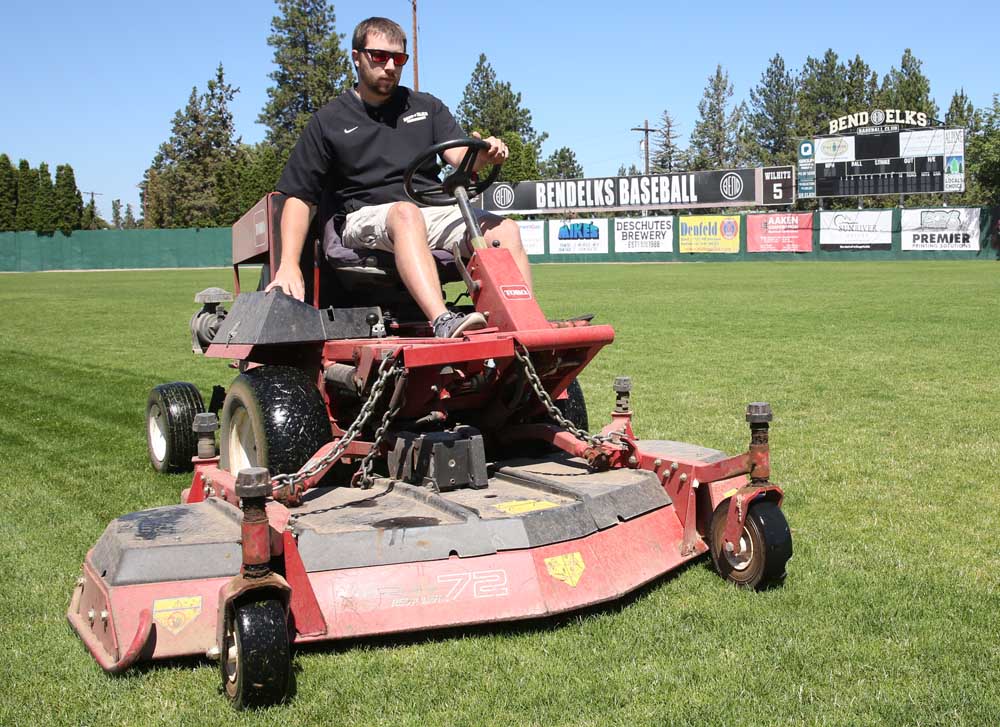A ton of chalk and 103 sprinklers — how the Bend Elks keep Vince Genna fresh
Published 12:00 am Tuesday, July 23, 2019

- Bend Elks general manager Michael Hirko mows the field at Vince Genna Stadium in Bend on Friday. (Dean Guernsey/Bulletin photo)
It is four days before Vince Genna Stadium, home of the Bend Elks, hosts the West Coast League’s All-Star Game. The team is on the road on this Friday morning, but the Elks’ general manager, Michael Hirko, and facilities director, Taylor McEuin, are at the stadium, discussing the possibility of having a special pattern mowed into the outfield grass for Tuesday’s league showcase event.
“We want to try to mow a star in the outfield, but we don’t know if that’s going to work or not,” McEuin says. “We’ve never really had to do a pattern that’s a little more obscure like that.”
Hirko and McEuin are the two-man team that tackles much of the groundskeeping work at Vince Genna, from replacing broken sprinkler heads to fertilizing the outfield. Hirko admits it is a bit unusual for a baseball higher-up such as himself to perform these tasks, but it saves the Elks money to have him and McEuin do many of the jobs themselves.
Besides, the pair say, they might be the best people for the job, since they have performed menial labor since they were young teens working summer jobs at Genna Stadium.
“He’s worked around here forever, I’ve worked around here forever, so we know what to do,” Hirko says.
“That’s why we don’t want to source it out to someone else, because we’d probably just have to do it anyways,” McEuin says, chuckling. “It’s just a whole lot easier for us to do it than teach someone else to do it.”
Hirko says he and McEuin usually do different groundskeeping tasks each day before games. For example, on the opening day of a series, they will repaint the Elks logo on the field. About three times a week, they will mow the outfield and infield grass. But during a stretch like last week, when the Elks were out of town for several straight days, Hirko says he lets the grass grow out, so the dead grass can rise to the top and get easily mowed off.
Mowing the outfield can take from 21⁄2 to five hours, depending on if they choose to use a more conventional riding mower or a higher-end Toro mower, Hirko explains. The infield grass takes only 20 minutes to mow.
Both Hirko and McEuin say the most annoying job is replacing sprinkler heads. There are 103 sprinklers distributed across the playing field at Genna Stadium — 88 of them in the outfield — and 10 heads have had to be replaced already this season. The cost is usually not too great, as most sprinkler heads are about $9 to $17, Hirko says. But putting the new head on requires digging 1 to 2 feet into the ground, then filling the hole and replacing the turf. The whole process can take about an hour for each head, and it can get messy.
“You have to dig down, then you get all muddy,” Hirko says. “But it’s just something you’ve gotta do.”
But although the sprinkler heads are a hassle to replace, starting the watering cycle is much simpler, as Hirko can control it from an app on his phone. He chuckles recalling that once he was even able to start the sprinkler system with the app while he was on vacation — in Rome.
With some aspects of groundskeeping at the stadium, even Elks coaches and players help out. Before games, players will take a fire hose to the infield dirt and base paths to keep down the dust. Coaches take turns chalking the foul lines along with Hirko and McEuin — the team goes through one ton of chalk each year, Hirko says. And most work involving the pitchers’ mound is left to the pitchers themselves, as each one has his own preferences.
“They do it how they like to do it,” Hirko says.
However, at the start of each season, the mound is rebuilt from scratch. According to Hirko, the Elks purchase two pallets of mound clay every year to rebuild the pitchers’ mound and redo the area around home plate, costing the team $800. They build a solid base for the mound, then put a top layer of dirt over it to create what fans see in the summer.
Of course, when you spend lots of time and money creating the mound, seeing pitchers dig at it throughout the season with metal cleats can drive you nuts, Hirko says.
“Pitchers like to make little holes for their kickoff, and when they land with their front foot, they kick out,” he says. “It’s kind of a huge pain — every time you see a pitcher start digging with their foot, it’s just money getting kicked out.”
Hirko says it is difficult to estimate annual groundskeeping costs for the Elks, as it varies year to year, though he guesses the amount is between $15,000 and $20,000 per year. Despite the price, Hirko says he is proud of the work he and McEuin do to make Genna Stadium ready for summer nights.
“It is not cheap to maintain the stadium and keep it looking green and healthy by any means,” Hirko wrote in an email. “But having a green luscious field is something that I take pride in and is something that I love to show off to the fans that come to all of our Bend Elks games.”
— Reporter: 541-617-7854, jhogan@bendbulletin.com






